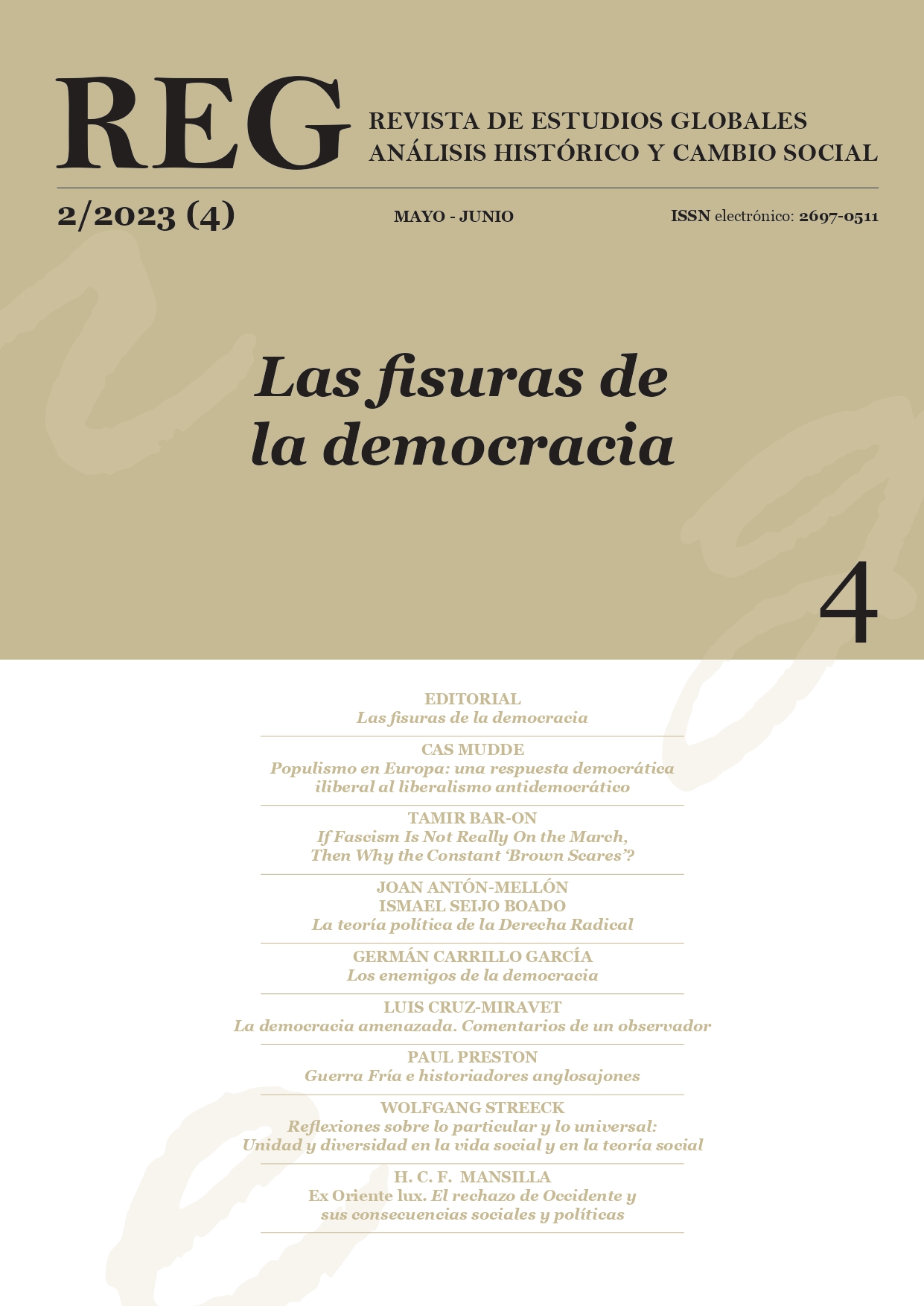Democracy threatened. Comments from an observer
Abstract
The purpose of this paper is to identify the context in which democracies develop and the causes of citizen disaffection towards them. A disaffection caused by the abandonment of the paradigm of the Welfare State and full employment, by the implementation of misguided economic and fiscal policies, by the inability to offer solutions and answers to the problems affecting citizens and democratic societies as a whole, for the failure to improve the structures and functioning of democracies without the necessary controls and in need of reform, for the failure to comply with electoral programs, for not firmly tackling the eradication of inequality, poverty and exclusion, for the unacceptable management of immigration and for corruption, including the so-called “revolving doors”. In short, a manifest disaffection on the part of many citizens who are convinced that their representatives are not concerned with improving their daily lives. This disaffection is, in turn, the cause of the emergence of new parties, political currents and independent candidates of different political persuasions with the common denominator of being considered populist by the establishment parties, which have been harmed by the Great Recession due to the application of austerity measures decreed by multilateral organizations.
Downloads
Metrics
-
Abstract404
-
pdf (Español (España))188
References
Alesina, A. y Ardagna, S. (1998). Tales of fiscal adjustment. Economic Policy, 13(27), 488-545. Disponible en: http://nrs.harvard.edu/urn-3:HUL.InstRepos:2579822
Bardhan, P. (2022). A World of Insecurity: Democratic Disenchantment in Rich and Poor Countries. Cambridge: Harvard University Press.
Bradford, A. (2021). The Brussels Effect: How the European Union rules the world. Oxford, UK: Oxford University Press.
Burgaya i Riera, J. (2013). El Estado de bienestar y sus detractores: a propósito de los orígenes y la encrucijada del modelo social europeo en tiempos de crisis. Barcelona: Octaedro.
Case, A., y Deaton, A. (2020). Muertes por desesperación y el futuro del capitalismo. Barcelona: Deusto.
Deaton, A. (2015). El Gran Escape. Madrid: Fondo de Cultura Económica.
Economist Intelligence (2022). Democracy Index 2022. Frontline democracy and the battle for Ukraine. Disponible en: https://www.eiu.com/n/campaigns/democracy-index-2022/
Eeckhout, J. (2022). La paradoja del beneficio. Cómo las empresas exitosas amenazan la economía. Barcelona: Taurus.
Foster Wallace, D. (2011). La broma infinita. Barcelona: DeBolsillo.
Fukuyama, F. (1992). The End of History and the Last Man. Nueva York: Free Press.
Galbraith, J. K. (1967). El Nuevo Estado Industrial. Barcelona: Ariel.
Giddens, A. (2000). Un mundo desbocado. Los efectos de la globalización en nuestras vidas. Madrid: Taurus.
Karl, P. (2012). La gran transformación. Los orígenes políticos y económicos de nuestro tiempo. México D.F.: Fondo de Cultura Económica.
Mazzucato, M. (2019a). El valor de las cosas. Barcelona: Taurus.
Mazzucato, M. (2019b). El Estado emprendedor: mitos del sector público frente al privado. Barcelona: RBA Libros.
Nieto García, A. (2005). El desgobierno judicial. Madrid: Trotta. 2ª ed.
Philippon, T. (2019). The Great Reversal: how America gave up on free markets. Cambridge: Harvard University Press.
Piketty, T. (2014). El capital en el siglo XXI. Madrid: Fondo de Cultura Económica.
Raworth, K. (2017). Doughnut economics: seven ways to think like a 21st-century economist. London: Random House International.
Rodrik, D. (2006). Goodbye Washington Consensus, Hello Washington Confusion? A Review of the World Bank’s Economic Growth in the 1990s: Learning from a Decade of Reform. Journal of Economic Literature, 44, 973-987.
Rodrik, D. (2011). The Globalisation Paradox: Why Global Markets, States, and Democracy Can’t Coexist. Oxford: Oxford University Press.
Sartre, J. P. (1945). El existencialismo es un humanismo. Conferencia impartida en el Club Maintenant de París por Jean-Paul Sartre, el 29 de octubre de 1945.
Stiglitz, J. (2012). El precio de la desigualdad. Barcelona: DeBolsillo.
Tooze, A. (2018). Crash. Cómo una década de crisis financieras ha cambiado el mundo. Barcelona: Crítica.
Zuboff, S. (2020). La era del capitalismo de la vigilancia. Barcelona: Paidós.
Copyright (c) 2023 Revista de Estudios Globales. Análisis Histórico y Cambio Social

This work is licensed under a Creative Commons Attribution-NonCommercial-NoDerivatives 4.0 International License.










